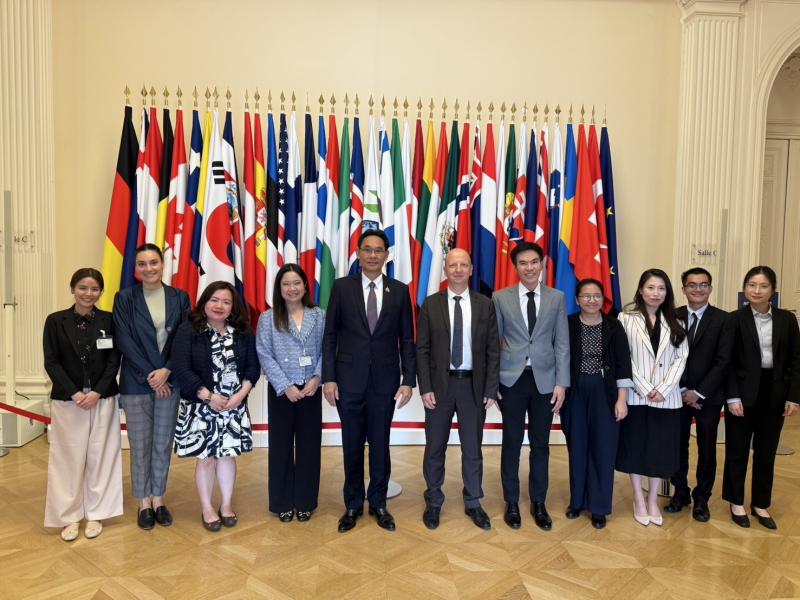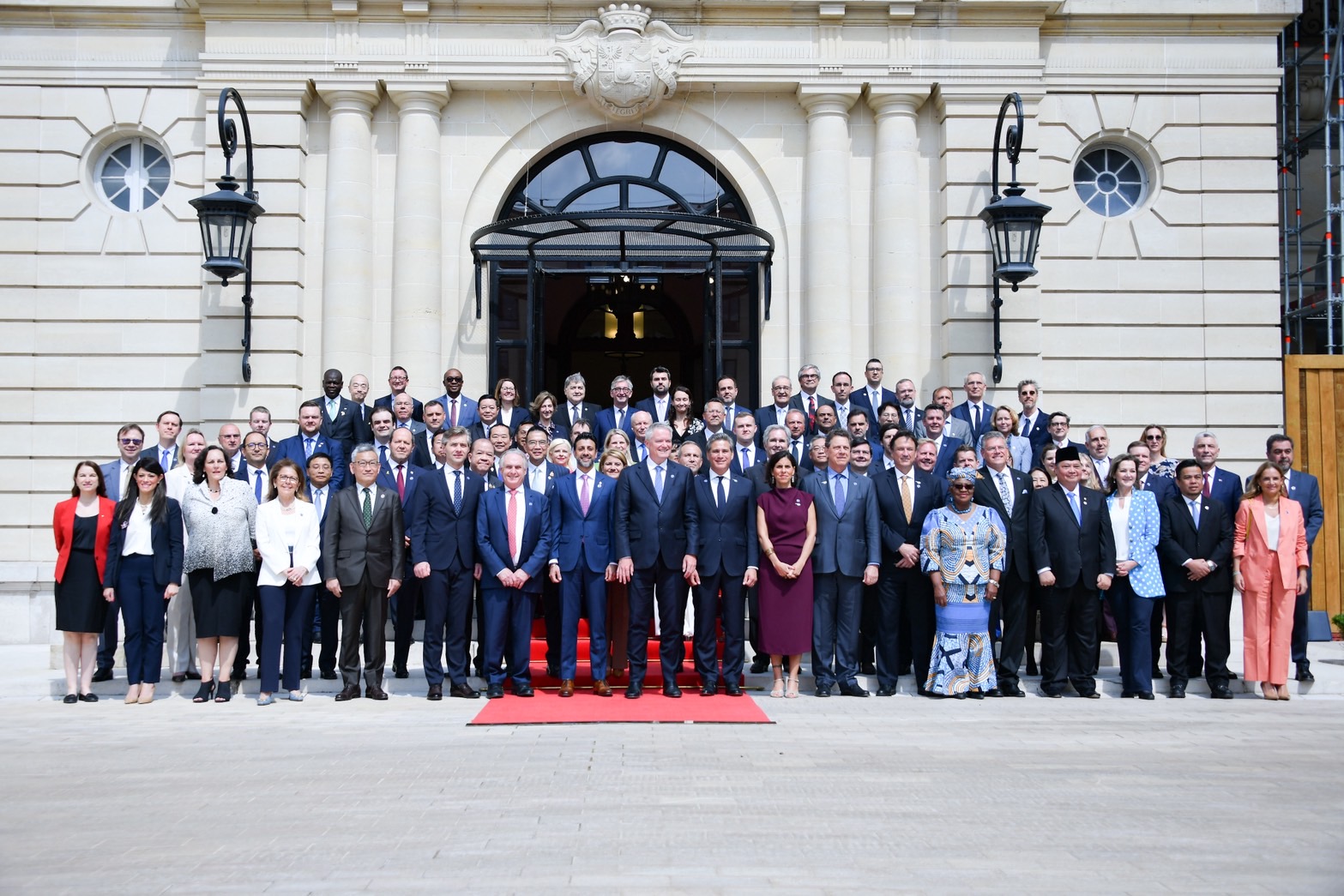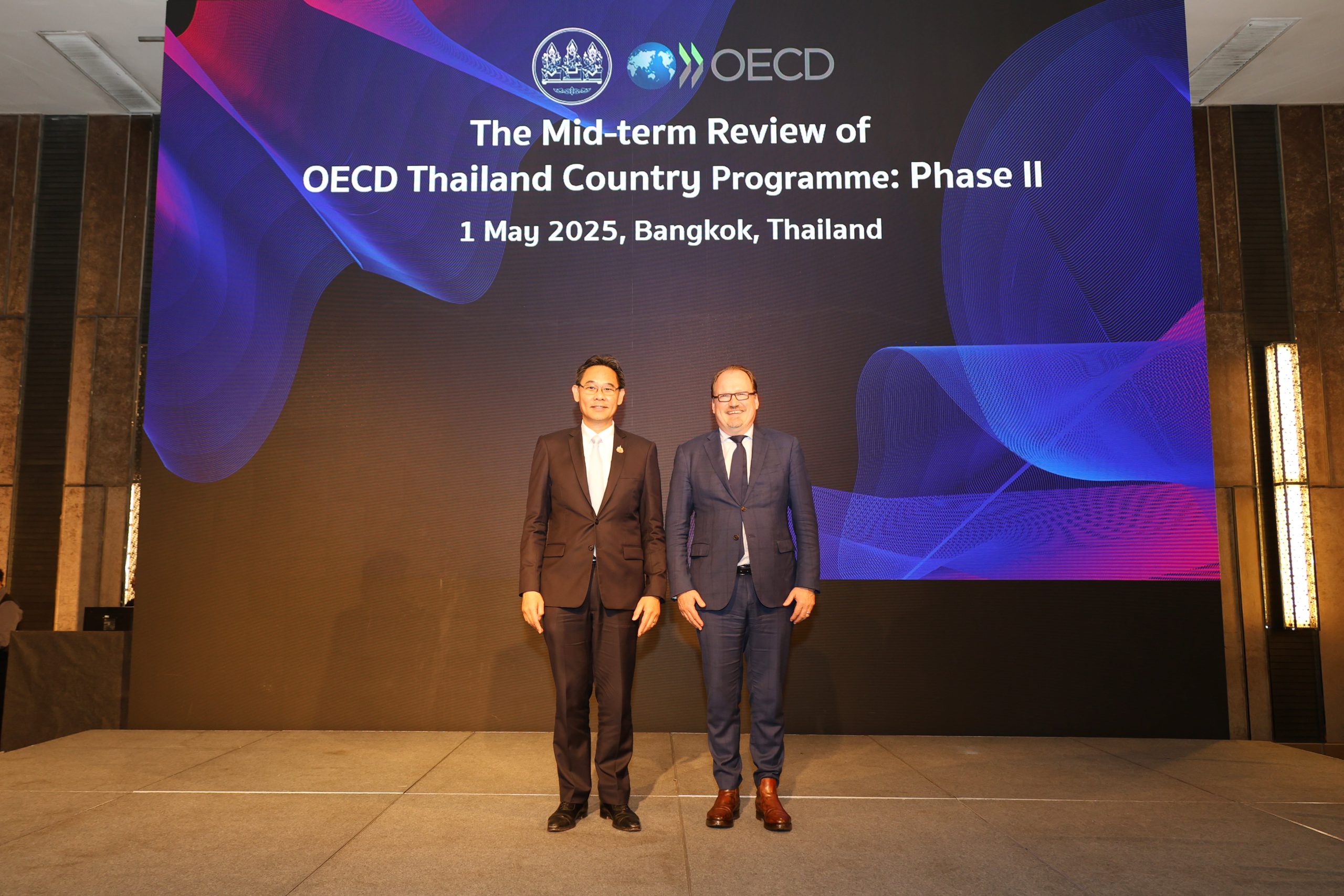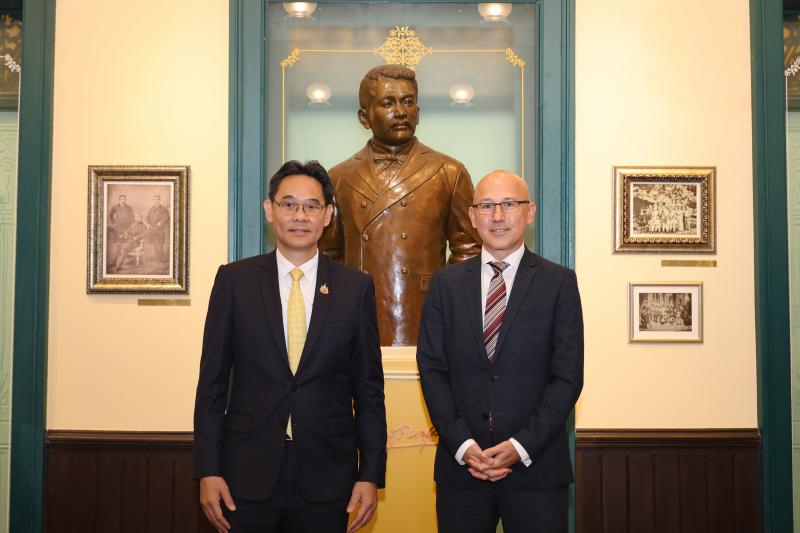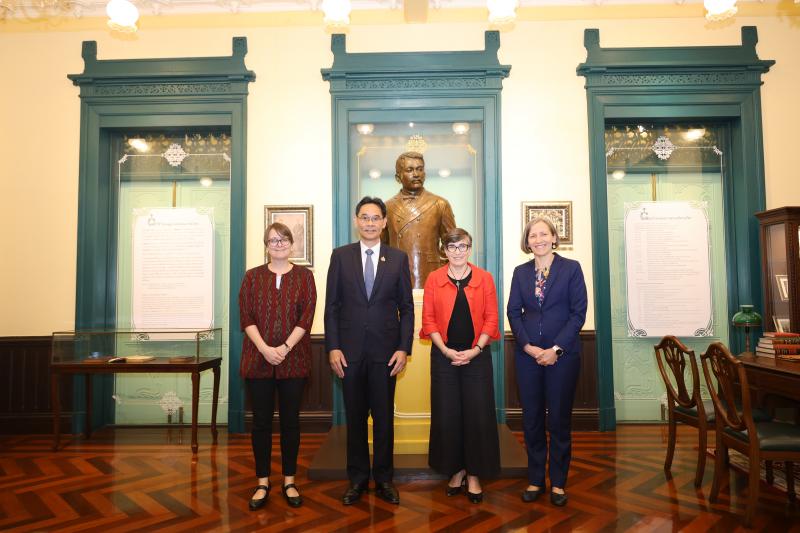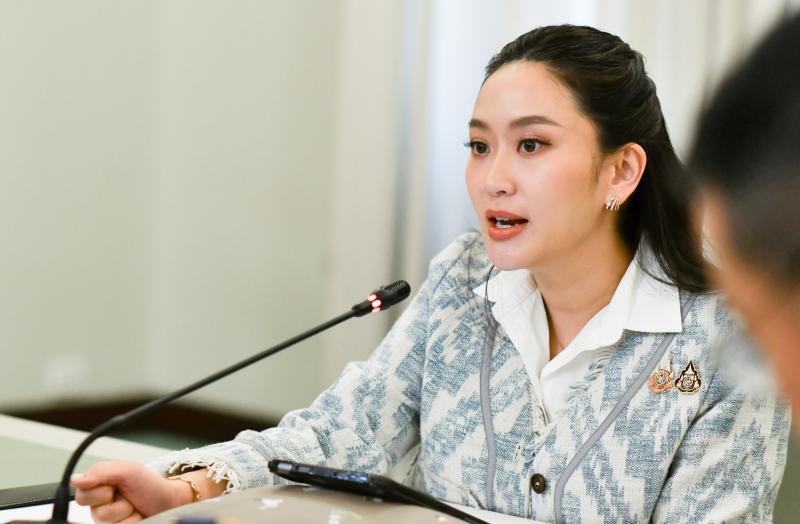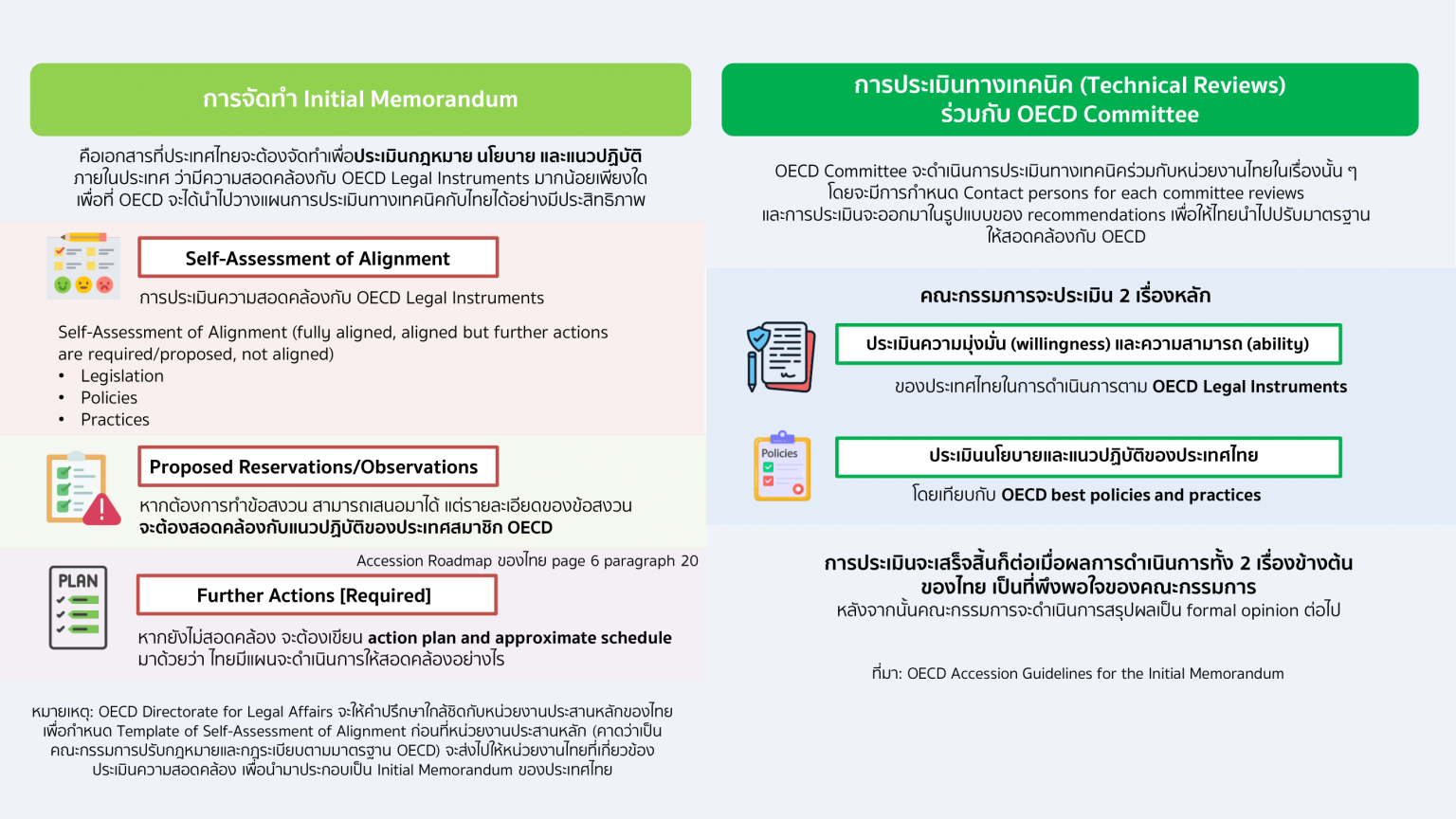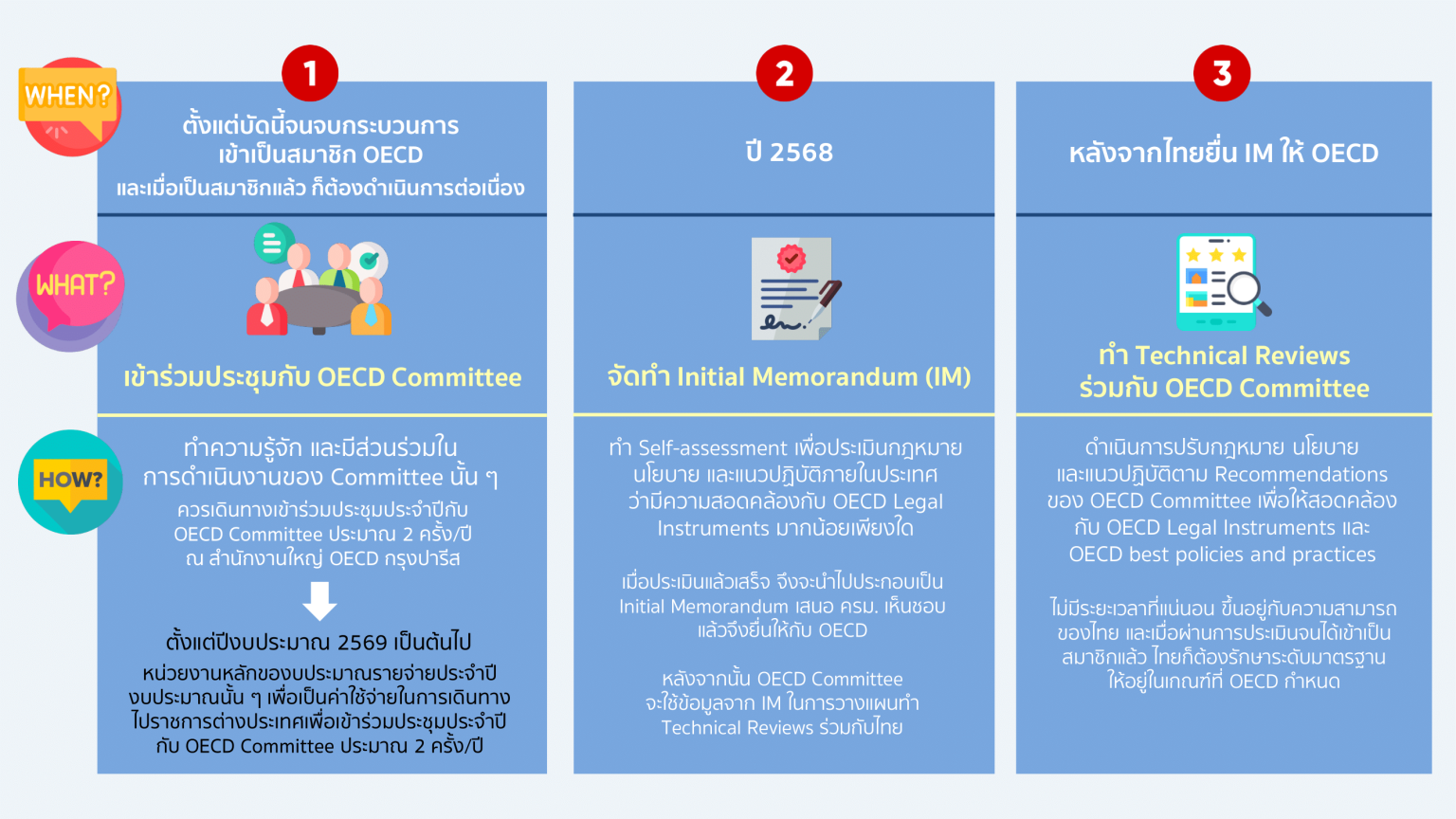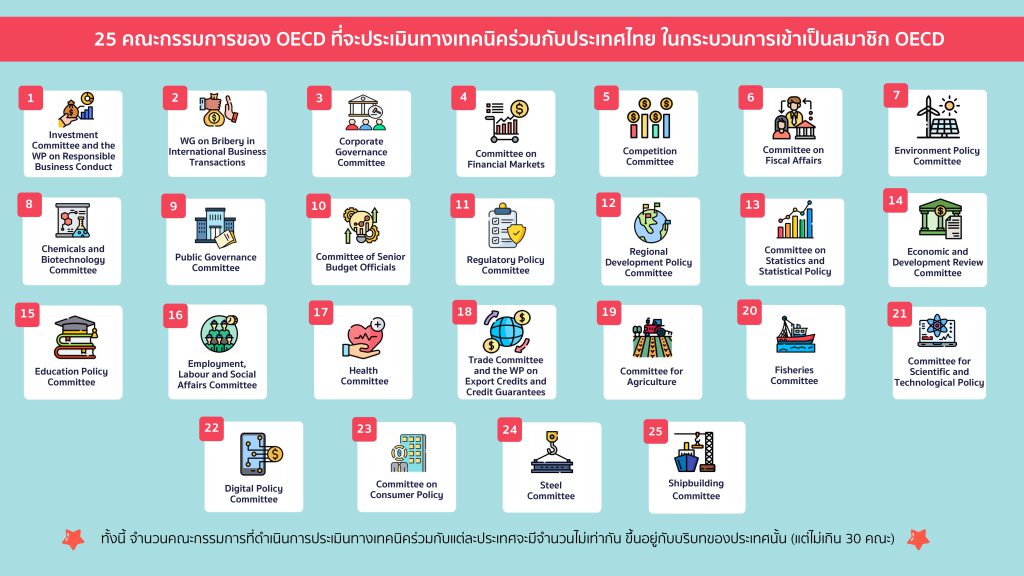News/Updates
NESDC Discusses with OECD senior representatives on advancing towards membership and exchanging knowledge on futures studies for national development
Mr. Danucha Pichayanan, Secretary-General of NESDC along with NESDC executives and officials participated in discussions with the Colombian Ambassador to the OECD and Romanian Chargé d’Affaires to exchange views on OECD membership and share knowledge on Strategic Foresight techniques for drafting the 14th National Economic and Social Development Plan (2028-2032) during June 22-27, 2025, in […]
NESDC Attended the OECD Ministerial Council Meeting and Parallel Discussions in Paris
On June 3-4, 2025, the Minister of Foreign Affairs, along with the Ambassador to Paris, Director-General of the International Economic Affairs Department, and Director of the International Cooperation Strategy and Coordination Division, NESDC Officials from the Ministry of Foreign Affairs and NESDC attended the OECD Ministerial Council Meeting 2025 (MCM 2025) under the theme “Leading […]
NESDC Hosts Conference to Disseminate Mid-term Implementation Results of OECD-Thailand Country Programme Phase 2 (CP2), Advancing Thailand’s Standards to International Level
On Thursday, May 1, 2025, the Office of the National Economic and Social Development Council (NESDC) in collaboration with the Organisation for Economic Co-operation and Development (OECD) organized the Conference to Disseminate the Mid-term Review Results of the OECD-Thailand Country Programme Phase 2 (The Mid-term Review of CP2) at Renaissance Bangkok Ratchaprasong Hotel, withMr. Danucha […]
Discussion Meeting between NESDC Secretary-General And the British Ambassador to Enhance Bilateral Cooperation and Drive Thailand’s OECD Membership Process
On March 24, 2025, Mr. Danucha Pichayanan, Secretary-General of NESDC, welcomed H.E. Mr. Mark Gooding OBE, British Ambassador to Thailand, along with NESDC executives and officials, together with representatives from the British Embassy who joined the discussion. During this occasion, both parties discussed and exchanged views on economic conditions, trade and investment, international economy, structural […]
The Secretary-General of NESDC Meeting with the Australian Ambassador to confirm Thailand’s commitment to joining the OECD, with Australia ready to provide support
On March 21, 2025, Mr. Danucha Pichayanan, Secretary-General of the NESDC, met with Dr. Angela Macdonald PSM (H.E. Dr. Angela Macdonald PSM), Australian Ambassador to Thailand, regarding support for Thailand’s OECD membership, as well as exchanging views and best practices on economic and social development. The meeting was attended by representatives from the Australian Embassy […]
The government has set a target for Thailand to become an OECD member by 2030 to elevate the country to greater international standards.
On March 10, 2025, Ms. Paetongtarn Shinawatra, Prime Minister chaired the 1st meeting of 2025 of the Committee for Overseeing Thailand’s OECD Membership Operations to establish guidelines for driving OECD membership. The meeting was attended by Mr. Pichai Chunhavajira, Deputy Prime Minister and Minister of Finance, Mr. Maris Sangiampongsa, Minister of Foreign Affairs, political officials, […]
NESDC Consults with Government Agencies on Planning Thailand’s OECD Membership Process for 2025
On Friday, December 20, 2024, the Office of the National Economic and Social Development Council (NESDC) organized a consultation meeting regarding Thailand’s OECD membership. The meeting aimed to help government agencies and private sector understand the OECD membership process, particularly for 2025 when Thailand must begin preparing the Initial Memorandum (IM), which is a preliminary […]
NESDC Special briefing on Thailand’s implementation process for OECD membership at the Trade Regulations and Multilateral Subcommittee meeting of the Federation of Thai Industries
On December 19, 2024, Dr. Nilsuwan Leelarasamee, Vice Chairman of the Federation of Thai Industries, chaired the 3/2024 Trade Regulations and Multilateral Subcommittee meeting. Representatives from the Office of the National Economic and Social Development Council (NESDC) and the Ministry of Foreign Affairs (MFA) were invited to deliver special presentations on “Thailand’s Implementation Process for […]
The Ministry of Education organizes a working group meeting to drive educational and skills development initiatives supporting Thailand’s OECD membership process
On December 13, 2024, Mr. Pichet Phopakdee, Deputy Permanent Secretary of the Ministry of Education, chaired the opening of the working group meeting on education and skills development to support Thailand’s OECD membership process. Representatives from the Ministry of Education (MOE), Ministry of Labor (MOL), Ministry of Higher Education, Science, Research and Innovation (MHESI), Office […]
Background and Significance
2565
February: Cabinet Resolution of February 15, 2022, acknowledged the results of Country Programme (CP) Phase 1 and assigned NESDC and MFA to consult with relevant agencies to develop CP Phase 2. Additionally, MFA was tasked to study the readiness, feasibility, and benefits Thailand would gain from OECD membership.
September: MFA commissioned TDRI to study and research the suitability of OECD membership. The study found that Thailand would benefit more from full membership than non-member status.
2566
March: The signing of the MoU for CP Phase 2 will help Thailand access OECD’s knowledge and best practices continuously, strengthen relationships, and bring Thailand closer to OECD membership.
December: Cabinet Resolution of December 26, 2023, approved Thailand’s letter of intent for OECD membership and assigned NESDC and MFA as main coordinating agencies for driving OECD membership.
2567
February: MFA submitted a copy of Thailand’s letter of intent for OECD membership to OECD, marking the official membership application.
16 April: Thailand submitted the original letter of intent for OECD membership.
17 June: OECD Council approved opening accession discussions with Thailand.
June: OECD Council approved Thailand’s OECD membership roadmap (Roadmap for the OECD Accession Process of Thailand).
10 July: OECD Council approved Thailand’s OECD membership roadmap (Roadmap for the OECD Accession Process of Thailand).
28 October: Prime Minister signed the order appointing the Committee for Supervising Thailand’s OECD Membership Process.
30 October: OECD Secretary-General paid a courtesy call to the Prime Minister and attended Thailand’s OECD accession process launch, presenting Thailand’s OECD membership roadmap to the Minister of Foreign Affairs.
2568
18 February: Cabinet Resolution of February 18, 2025, acknowledged progress in Thailand’s OECD membership and approved the fiscal year 2025 central budget, emergency reserve funds for implementing the OECD membership process project.
10 March: Prime Minister chaired the Committee for Supervising Thailand’s OECD Membership Process meeting, which set the goal for Thailand to achieve OECD membership by 2030.
8 July: Cabinet Resolution of July 8, 2025, acknowledged and approved the results of the first meeting of the Committee for Supervising Thailand’s OECD Membership Process (1/2025) and instructed relevant agencies to continue concrete implementation of Thailand’s OECD membership process.
OECD Membership Process
The OECD membership process consists of two main phases: Pre-accession Process and Accession Process.

Factsheet on Thailand’s OECD Membership
Factsheet on Thailand’s OECD Membership Status as of August 18, 2025
- Background
- Thailand’s OECD Membership Process
- Benefits and Impacts of OECD Membership
- OECD Business Network (Business at OECD: BIAC)
- OECD Parliamentary Network (Global Partnership Network: GPN)
- Thailand’s Current OECD Membership Process
- Next Steps in Thailand’s Domestic Implementation
Roadmap for the OECD Accession Process of Thailand
Framework for OECD Membership Consideration
(Framework for the Consideration of Prospective Members)
Consists of 5 conditions to guide Thailand’s implementation of OECD membership process, including:
STATE OF READINESS

1. STATE OF READINESS
Country’s Readiness to Align Standards with OECD
COUNTRY’S COMMITMENT TO OECD VALUES AND MEMBERSHIP OBLIGATIONS

2. COUNTRY’S COMMITMENT TO OECD VALUES AND MEMBERSHIP OBLIGATIONS
Country’s Commitment to OECD Values and Membership Obligations
INSTITUTIONAL FRAMEWORK

3. INSTITUTIONAL FRAMEWORK
Public Administration Framework and Institutional Structure
KEY ECONOMIC INDICATORS

4. KEY ECONOMIC INDICATORS
Key Economic Indicators
RELATIONS WITH THE OECD

5. RELATIONS WITH THE OECD
OECD Engagement

4. key economic indicators
Key Economic Indicators

5. relations with the oecd
OECD Engagement
Related Documents
Framework for the Consideration of Prospective Members and 6 OECD Legal Instruments related to Framework
6 OECD Legal Instruments related to
Framework for the Consideration of Prospective Members
1. Declaration on International Investment and Multinational Enterprises
- Adherence to Declaration on International Investment and Multinational Enterprises requires adherence to 13 other OECD Acts listed below including 4 legally binding Decisions and 9 Recommendations
4 Legal Binding Include:
- Decision of the Council on International Investment Incentives and Disincentives
- Decision of the Council on Conflicting Requirements being imposed on Multinational Enterprises
- Third Revised Decision of the Council concerning National Treatment
- Decision of the Council on the OECD Guidelines for Multinational Enterprises
9 Recommendations Include:
- Recommendation of the Council on Member Country Measures concerning National Treatment of Foreign-Controlled Enterprises in OECD Member Countries and Based on Considerations of Public Order and Essential Security Interest
- Recommendation of the Council concerning Member Country Exceptions to National Treatment and National Treatment related Measures concerning Investment by Established Foreign-Controlled Enterprises
- Recommendation of the Council on Member Country Exceptions to National Treatment and National Treatment related Measures concerning the Services Sector
- Recommendation of the Council on Member Country Exceptions to National Treatment and National Treatment related Measures in the Category of Official Aids and Subsidies
- Recommendation of the Council on Member Country Exceptions to National Treatment and Related Measures concerning Access to Local Bank Credit and the Capital Market
- Recommendation of the Council on Guidelines for Recipient Country Investment Policies relating to National Security
- Recommendation of the Council Due Diligence Guidance for Responsible Supply Chains of Minerals from Conflict-Affected and High-Risk Areas
- Recommendation of the Council the OECD-FAO Guidance for Responsible Agricultural Supply Chains
- Recommendation of the Council on the Due Diligence Guidance for Meaningful Stakeholder Engagement in the Extractive Sector
2. Convention on Combating Bribery of Foreign Public Officials in International Business Transactions and Related Documents
3. OECD Code of Liberalisation of Capital Movements and OECD Code of Liberalisation of Current Invisible Operations
- OECD Code of Liberalisation of Capital Movements
- Reservations to the Code of Liberalisation of Capital Movements
- OECD Code of Liberalisation of Current Invisible Operations
- Reservations to the Code of Liberalisation of Current Invisible Operations
4. Recommendation of the Council on Principles of Corporate Governance
5. OECD Council Recommendation on Principles for Internet Policy Making Corporate Governance
6. Recommendation of the OECD Council on Good Statistical Practice
Examples of OECD Member Countries’ Reservations
Thailand’s adherence to OECD Legal Instruments
Thailand’s adherence to OECD Legal Instruments

Currently, Thailand has adhered to 12 out of 273 OECD Legal Instruments *Status as of October 2024
https://legalinstruments.oecd.org/en/adherences Click on Adherent(s)* and select Thailand then Search
OECD Legal Instruments
that Thailand has adhered to
List of OECD Legal Instruments
that Thailand has currently adhered to
| OECD Legal Instruments | Year | Responsible Agency | |
| 1 | Declaring on Protecting and Empowering Consumers in the Digital and Green Transition | 2024 | Office of the Consumer Protection Board |
| 2 | Declaration on Transformative Science, Technology and Innovation Policies for a Sustainable and Inclusive Future | 2024 | Office of the Higher Education, Science, Research and Innovation Policy Council |
| 3 | Multilateral Convention to Implement Tax Treaty Related Measures to Prevent Base Erosion and Profit Shifting | 2022 | Revenue Department |
| 4 | Protocol amending the Convention on Mutual Administrative Assistance in Tax Matters | 2022 | Revenue Department |
| 5 | Recommendation of the Council on Regulatory Policy and Governance | 2021 | Office of the Council of State |
| 6 | Declaration on the Fight against Foreign Bribery – Towards a New Era of Enforcement | 2016 | National Anti-Corruption Commission |
| 7 | Daejeon Declaration on Science, Technology and Innovation Policies for the Global and Digital Age | 2015 | Office of the Higher Education, Science, Research and Innovation Policy Council |
| 8 | Decision-Recommendation of the Council on Compliance with Principles of Good Laboratory Practice | 2010 | Department of Medical Sciences |
| 9 | Decision of the Council concerning the Mutual Acceptance of Data in the Assessment of Chemicals | 2010 | Department of Medical Sciences |
| 10 | Paris Declaration on Aid Effectiveness | 2005 | Ministry of Foreign Affairs |
| 11 | Istanbul Ministerial Declaration on Fostering the Growth of Innovative and Internationally Competitive SMEs | 2004 | Office of Small and Medium Enterprises Promotion |
| 12 | International Understanding on Maritime Transport Principles | 1999 | – |
Thailand’s Status in OECD Committees/Subsidiary Bodies
Thailand’s Status in OECD Committees/Subsidiary Bodies
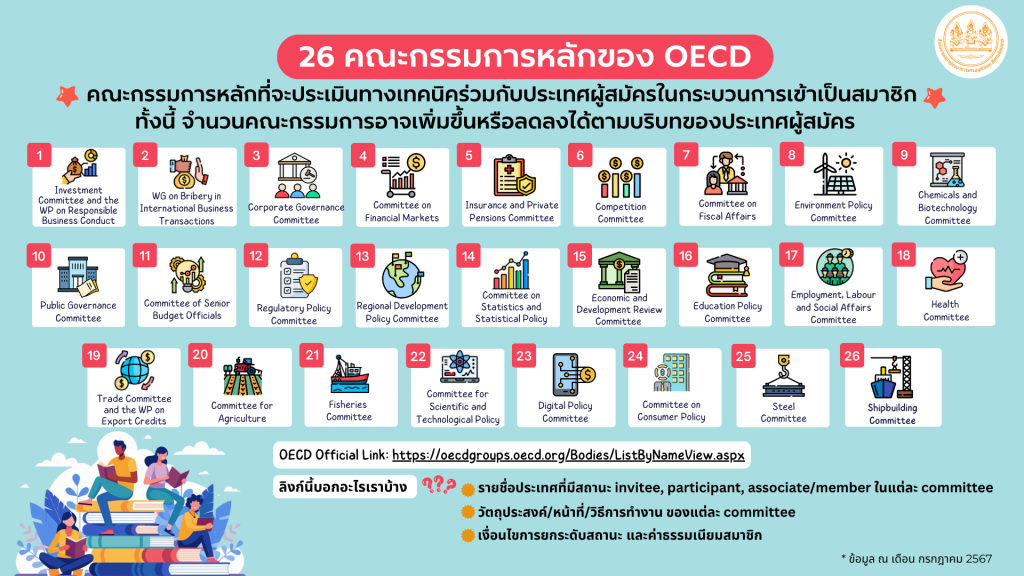
- Currently, Thailand has three types of status in OECD Committees: Invitee in 37 committees, Participant in 5 committees, and Associate/Member in 6 committees, totaling 48 committees out of approximately 300 committees
https://www.oecd.org/about/structure/ - Rights and conditions for each level: Invitee can attend meetings on a case-by-case basis with no fee; Participant can attend all meetings with fees ranging from 4,500 – 13,300 euros/year; and Associate/Member has rights equivalent to full member with fees ranging from 25,000 – 63,200 euros/year
- *OECD Official Link: https://oecdgroups.oecd.org/Bodies/ListByNameView.aspx
List of OECD Committees/Subsidiary Bodies where Thailand has Invitee status
OECD Committee & Bodies or projects to which the Partner’s status applies Year Responsible Agency 1. Development Assistance Committee 2023 Thailand International Cooperation Agency (TICA) 2. Committee on Fiscal Affairs, Economic Policy Committee, Environment Policy Committee
-Inclusive Forum on Carbon Mitigation Approaches Project
2022 – 3. Committee of Senior Budget Officials
-Committee of Senior Budget Officials, WP on Financial Management and Reporting & WP of Parliamentary Budget Officials and Independent Fiscal Institutions2022 Bureau of the Budget 4.-7. Investment Committee
-The Future of Investment Treaties – Track2
-IC(D) Enlarged Session of work related to the Declaration on International Investment and MNEs and related instruments
-Freedom of Investment Roundtable
-Working Party on Responsible Business Conduct2021 Ministry of Foreign Affairs 8. Committee on Financial Markets 2021 – 9. Chemicals and Biotechnology Committee 2020 Bureau of Laboratory Quality Standards 10. Committee on Consumer Policy 2020 – OECD Committee & Bodies or projects to which the Partner’s status applies Year Responsible Agency 11. Investment Committee; Committee on Statistics and Statistical Policy
-Working Group on International Investment2019 – 12.-13. Trade Committee
-Working Party on Export Credits and Credit Guarantees
-All bodies except the Working Party on Export Credits and Guarantees2017 – 14. Co-operative Action Programme on Local Employment and Economic Development (LEED) Directing Committee (Co-operative Action Programme on Local Employment and Economic Development (LEED) Directing Committee) 2017 – 15.-16. Insurance and Private Pensions Committee
-Working Party of Governmental Experts on Insurance
– IPPC; WPPP; TFPS2017 Office of Insurance Commission/Government Pension Fund 17. Economic Policy Committee
-WP on Short-Term Economic Prospects2016 NESDC 18. Public Governance Committee 2014 Office of the Public Sector Development Commission/Office of the Civil Service Commission 19. Public Governance Committee & Committee of Senior Budget Officials
-WP on Performance and Results & Network of Senior Infrastructure and Public-Private Partnerships Officials2014 OSMEP 20. Regional Development Policy Committee 2014 – OECD Committee & Bodies or projects to which the Partner’s status applies Year Responsible Agency 21. Competition Committee 2014 Office of Trade Competition Commission 22. Working Group on Bribery in International Business Transactions*
-Working Group on Bribery in International Business Transactions2013 National Anti-Corruption Commission 23. Committee for Agriculture; Trade Committee
-Joint Working Party on Agriculture and Trade2013 – 24. Trade Committee; Environment Policy Committee
-Joint Working Party on Trade and Environment2013 – 25. Centre for Educational Research and Innovation (CERI) Governing Board
-CERI Governing Board2013 – 26. Committee for Agriculture 2013 – 26. Committee on Financial Markets; Insurance and Private Pensions Committee
-Joint Task Force on Institutional Investors and Long-Term Financing2013 – 27. Committee on Financial Markets 2013 – 28. Regulatory Policy Committee
-Network of Economic Regulators2013 Official Information Commission 30. Education Policy Committee 2013 Office of the Education Council OECD Committee & Bodies or projects to which the Partner’s status applies Year Responsible Agency 31. Steel Committee
-Steel Committee2013 – 32. Tourism Committee 2013 33. Committee on Industry, Innovation and Entrepreneurship
-Main Committee2013 – 34. Environment Policy Committee 2013 Office of Natural Resources and Environmental Policy and Planning 35. Environment Policy Committee; Committee of Fiscal Affairs
-Joint Meeting of Tax and Environment Experts2013 – 36. Committee for Agriculture; Environment Policy Committee
-Joint Working Party on Agriculture and the Environment2013 – 37. Committee on Fiscal Affairs 2013 Revenue Department
List of OECD Committees/Subsidiary Bodies where Thailand has Participant status
| OECD Legal Committee | Year | Responsible Agency | |
| 1 | Regulatory Policy Committee | Participant 2022 | Office of the Council of State |
| 2 | Committee on Digital Economy Policy (Including all its subsidiary bodies) *OECD renamed to Digital Policy Committee since December 14, 2023 | Participant 2018 | Ministry of Digital Economy and Society |
| 3 | Committee for Scientific and Technological Policy (Including all its subsidiary bodies) | Participant 2016 | Office of the Higher Education, Science, Research and Innovation Policy Council |
| 4 | Committee on SMEs and Entrepreneurship | Participant 2008 | Office of Small and Medium Enterprises Promotion |
| 5 | Fisheries Committee | Participant 2006 | Department of Fisheries |
List of OECD Committees/Subsidiary Bodies where Thailand has Associate/Member status
| OECD Committee | Year | Responsible Agency | |
| 1 | Chemical and Biotechnology Committee in Mutual Acceptance of Data (MAD) – related bodies (Working Group on National Co-ordinators of the Test Guidelines Programme and Working Group on Good Laboratory Practice) | Associate 2019 | Department of Medical Sciences |
| 2 | Programme for International Student Assessment (PISA) Governing Board (as a PGB Associate) | Associate 2019 | Ministry of Education |
| 3 | Project on Base Erosion and Profit Shifting (BEPS) of the Committee on Fiscal Affairs | Member 2017 | Revenue Department |
| 4 | Global Forum on Transparency and Exchange of Information for Tax Purpose (as a member) | Member 2017 | Revenue Department |
| 5 | International Energy Agency (IEA) – (as an Association country) | Associate 2015 | Office of the Higher Education, Science, Research and Innovation Policy Council |
| 6 | Governing Board of the Development Centre (as a member) | Member 2005 | Department of International Cooperation |
Download documents from past meetings
Frequently asked questions
Sometimes we may see the term “OCDE.” Do not assume it is a typo, as it may be written in French. “OCDE” (O-C-D-E) is the French abbreviation for Organisation de coopération et de développement économiques, while in English it is “OECD” (O-E-C-D), which stands for Organisation for Economic Co-operation and Development.
Pros
- Promotes multi-dimensional structural reforms and establishes international standards
- Increases trade competitiveness and opportunities to access member country markets
- Thailand’s GDP will grow by 1.6%, equivalent to 270 billion baht in 2020
- Greater access to global economic databases
- Receive close consultation and technical assistance from OECD
- Enhance Thailand’s image and promote Thailand’s role on the global stage
Cons
- Annual membership fees of approximately 3-7 million euros per year, depending on the country’s economic size
- Membership may impact the economy and society in certain areas, such as disclosure requirements and non-discrimination obligations
- OECD functions as a think tank that serves as a platform for experts and a repository of diverse data, where countries can seek consultation or use as a knowledge source for addressing various issues.
- OECD’s distinctive feature is its committee-based approach with experts covering multiple fields, emphasizing the development of new knowledge according to the changing global context.
- There is no punishment system for member countries that fail to comply with common standards, but peer review mechanisms are used to evaluate compliance and provide academic opinions.
- No financial assistance is provided to member countries, but emphasis is placed on discussions to establish standards and support policies to help develop well-being and build a stronger, cleaner, and more equitable world, according to the motto “Better policies for better lives.”
- TDRI research indicates that if Thailand becomes a member, inequality would decrease slightly, which is not statistically significant. Therefore, it can be concluded that OECD membership does not significantly increase or decrease Thailand’s inequality.
- Membership has both beneficiaries and those who may be disadvantaged. Therefore, Thailand may consider making reservations on issues that must preserve national interests, and the government must have measures to compensate those affected.
- Examples of reservations made by Costa Rica, which has an economy similar in size to Thailand, include:
- Allowing foreigners to use land for business only in certain areas
- Specialized professions such as doctors and engineers must operate according to domestic regulations only
- Domestic land transportation services can only be operated by Costa Rican companies, with Costa Rican nationals holding at least 51% of shares
- Thailand has cooperated with OECD for over 20 years and has adjusted standards to align with OECD to some extent through Country Programme Phase 1 (2018-2021) and Phase 2 (2023-2025)
- Thailand has endorsed 11 out of 271 OECD instruments and has continuously upgraded its status in committees. For example, in 2021, NESDC received Participant status in the Regulatory Committee
- OECD places Thailand in tier 1, which OECD is interested in inviting for membership
- The OECD membership process may involve Article 178 of the Constitution of the Kingdom of Thailand B.E. 2560 (2017) regarding treaties to be implemented jointly with international organizations
- Therefore, the matter may be brought to Parliament for consideration, with details to be discussed with the Department of Treaties and Legal Affairs and the Office of the Council of State
NESDC The Ministry of Foreign Affairs will discuss with OECD and invite relevant Thai agencies to participate in discussions, presenting reasons and concerns why Thailand may not be able to adjust to OECD standards. Agencies can negotiate to make reservations on certain issues, based on Thailand’s interests
- No country has failed to meet OECD standards and been told to cancel. There have only been internal events in those countries that caused OECD to announce the termination of the Accession process, and cases where member countries vetoed candidate countries due to personal conflicts
- Russia is a country where OECD announced the termination of the Accession process in 2014 due to the Crimean crisis. Russia had been in the Accession process since 2007
- Croatia was vetoed but ultimately received unanimous consensus to enter the Accession process. In 2017, Croatia submitted its intention to become a member but was vetoed by Hungary due to conflicts between the two countries over an oil company corruption case. However, in 2018, Hungary ended its opposition to membership, allowing Croatia to receive unanimous consensus to enter the Accession process in 2022
TDRI research indicates that from evaluating the economies of 7 member countries with economic sizes similar to Thailand, membership helps increase overall national productivity, resulting in direct GDP growth of 0.05% and net economic expansion of 1.6% in the first 5 years
Upgrading cooperation status demonstrates Thailand’s commitment to higher-level cooperation with OECD, particularly Associate status, which is equivalent to full membership of OECD. This represents good value in demonstrating Thailand’s commitment to OECD member countries
We should not view OECD membership as an FTA or a matter of gains and losses, as OECD membership is not equivalent to an FTA and is not an FTA by nature. Rather, it is about creating common standards and enhancing governance, which may help facilitate FTA negotiations
Currently, the schedules of the Foreign Business Act B.E. 2542 (1999) follow a Negative List approach (allowing everything except reserved matters) as OECD desires, except Schedule 3 (21) which remains a Positive List (reserving everything except permitted matters). However, the Foreign Business Act is currently undergoing performance evaluation under the Act on Principles for Drafting Laws and Evaluation of Legal Performance B.E. 2562 (2019), which is expected to be completed by 2024. The Ministry of Commerce may consider using the evaluation results to improve the Foreign Business Act to align with OECD conditions and maximize benefits for Thailand. Additionally, Sunset Clauses, which are provisions that terminate the application of laws, can be used to set expiration periods for reservations to create transition periods for relevant sectors to have sufficient time to adapt or operate in accordance with OECD standards
OECD has a committee called the “Regional Development Policy Committee” that provides recommendations on regional policy development, including local development. Relevant Thai agencies can express interest in joining this committee to create participation and benefit from membership to improve and develop operations in accordance with OECD standards
The OECD membership process has no fixed timeframe. It depends on the candidate country’s ability to reform its operations to align with OECD standards. OECD committees in each area will evaluate whether the candidate country has successfully adjusted internal regulations to comply with OECD standards as specified in the Accession Roadmap, before issuing an invitation letter for the candidate country to accept legal obligations and become a full OECD member
Conflicts are unlikely since most current OECD member countries are also WTO members, and WTO has close cooperation with OECD and observer status in the OECD Trade Committee
Joint seminars between the public and private sectors should be organized to increase awareness, focusing on sustainability and keeping pace with rapidly changing technology, particularly regarding impacts on young entrepreneurs who are important leaders of economic transition
NESDC will organize workshops to raise awareness of Thailand’s OECD membership for the private sector, civil society, and relevant sectors, possibly inviting representatives from the Thai Chamber of Commerce to participate as panelists in the meetings, scheduled for January-February 2024

